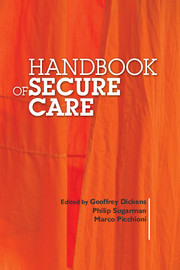Book contents
- Frontmatter
- Contents
- List of tables, boxes and figures
- List of contributors
- Preface
- 1 The evolution of secure and forensic mental healthcare
- 2 Mental disorder and offending
- 3 Clinical risk assessment in secure care
- 4 Risk management in secure care
- 5 Recovery in secure environments
- 6 Personality disorder
- 7 Women's mental health, aggression and offending
- 8 Offenders with intellectual disability in secure services and the criminal justice system
- 9 Secure mental healthcare for young people
- 10 Secure care for people with autism spectrum disorder
- 11 Acquired brain injury, trauma and aggression
- 12 Managing aggression and violence in older people
- 13 Firesetting in secure settings: theory, treatment and management
- 14 Specialist psychological treatment programmes in secure mental healthcare
- 15 Nursing in secure mental healthcare settings
- 16 Prescribing for specialist populations
- 17 Human rights in secure psychiatric care
- 18 Quality assurance and clinical audit in secure psychiatric care
- 19 Psychological support following violent assault and trauma: what works for staff in secure settings?
- Index
10 - Secure care for people with autism spectrum disorder
Published online by Cambridge University Press: 02 January 2018
- Frontmatter
- Contents
- List of tables, boxes and figures
- List of contributors
- Preface
- 1 The evolution of secure and forensic mental healthcare
- 2 Mental disorder and offending
- 3 Clinical risk assessment in secure care
- 4 Risk management in secure care
- 5 Recovery in secure environments
- 6 Personality disorder
- 7 Women's mental health, aggression and offending
- 8 Offenders with intellectual disability in secure services and the criminal justice system
- 9 Secure mental healthcare for young people
- 10 Secure care for people with autism spectrum disorder
- 11 Acquired brain injury, trauma and aggression
- 12 Managing aggression and violence in older people
- 13 Firesetting in secure settings: theory, treatment and management
- 14 Specialist psychological treatment programmes in secure mental healthcare
- 15 Nursing in secure mental healthcare settings
- 16 Prescribing for specialist populations
- 17 Human rights in secure psychiatric care
- 18 Quality assurance and clinical audit in secure psychiatric care
- 19 Psychological support following violent assault and trauma: what works for staff in secure settings?
- Index
Summary
Introduction
Historically, relatively little attention has been paid to the specialist needs of people with autism spectrum disorders (ASDs) within forensic hospital services. This is partly because it was seen as a condition affecting children, and partly because the relationship between the condition and offending and challenging behaviour has only been recognised relatively recently. In the UK a high-profile campaign by the National Autistic Society led to the Autism Act 2009 and a national strategy (Department of Health, 2010), which has increased awareness of the condition among psychiatrists and other health professionals. This has been followed by the publication of a National Institute for Health and Care Excellence (NICE) guideline on the recognition, referral, diagnosis and management of adults on the autism spectrum (National Institute for Health and Clinical Excellence, 2012).
Whereas in the UK psychiatric training has, in the past, paid insufficient regard to the existence of ASD in adults without an intellectual disability, the demand for services for people with ASD is now too great to be met by specialist teams alone. This was recognised by the Royal College of Psychiatrists, which published recommendations on diagnosis and assessment, management, service provision, research and training (Royal College of Psychiatrists, 2014) and which has developed teaching programmes aimed at equipping general psychiatrists with the necessary skills to recognise and treat this group of patients (Royal College of Psychiatrists, 2011).
All psychiatrists should have a basic knowledge of autism spectrum disorders. However, the more complex or high-risk cases are likely to require specialist services.
In this chapter we examine the history, definition and classification of ASD. We describe the epidemiology of the condition, its relation to offending and challenging behaviours and its treatment and management in secure care.
Definition and classification of ASD
We use the term autism spectrum disorder, although it is recognised that some prefer the term autism spectrum condition. Pervasive developmental disorder is also used; it encompasses ASD and the rare and severe Rett's syndrome and childhood disintegrative disorder. The conditions included within the autism spectrum are classified as childhood autism, atypical autism and Asperger's syndrome in the International Classification of Diseases (ICD-10; World Health Organization, 2008). In the Diagnostic and Statistical Manual (DSM-IV-TR; American Psychiatric Association, 2000) the classification included autism, Asperger's syndrome and pervasive developmental disorder not otherwise specified (PDD-NOS).
- Type
- Chapter
- Information
- Handbook of Secure Care , pp. 148 - 162Publisher: Royal College of PsychiatristsPrint publication year: 2015



